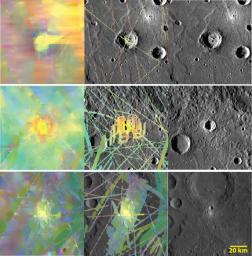
|
One a Penny, Two a Penny, Bright, Fresh Crater
- Click the image above for a larger view
- Full-Res JPEG (1802 x 1826) (471.8 kB)
- Full-Res TIFF (1802 x 1826) (9.9 MB)
Caption:
The left column of images shows MASCS VIRS interpolated color composites of Kertesz (top), Dominici (middle), and an unnamed crater (bottom). The middle column shows the VIRS color composite of spectral footprints, and the right column shows monochrome MDIS images for the same areas. Yellow areas are highly reflective and thought to be relatively young, exhibiting fewer effects of space weathering . Kertesz and Dominici are also known to contain hollows , which are shallow depressions with younger surfaces likely caused by the loss of volatiles.
The VIRS composite shows hundreds of individual footprints tracks (minimum 100-200 m across and 3-4 km long) taken from different directions and altitudes. In locations where multiple footprints cover the same area, the footprint with the best illumination for mineralogical interpretation (usually the lowest incidence angle where shadows are minimized) is used for making the map. Where footprints are sparse, interpolation is required for full spatial coverage.
Date Created:
July 28, 2014
Instruments:
Visible and Infrared Spectrograph (VIRS) of the Mercury Atmosphere and Surface Composition Spectrometer (MASCS) and Mercury Dual Imaging
System (MDIS)
VIRS Color Composite Wavelengths:
575 nm as red, 415 nm/750 nm as green, 310 nm/390 nm as blue
Center
Latitudes:
27.3° (top); 1.18° (middle); -3.6° (bottom)
Center Longitudes:
146.1° E (top); 323.5° E (middle); 60.9° E (bottom)
Resolution:
0.5 km/pixel
Scale:
Kertesz crater (top) has a diameter of 32 km (20 mi.); Dominici crater (middle) has a diameter of
20 km (12 mi.)
Background Info:
The MESSENGER spacecraft is the first ever to orbit the planet Mercury, and the spacecraft's seven scientific instruments and radio science investigation are unraveling the history and evolution of the Solar System's innermost planet. During the first two years of orbital operations, MESSENGER acquired over 150,000 images and extensive other data sets. MESSENGER is capable of continuing orbital operations until early 2015.
For information regarding the use of images, see the MESSENGER image use policy .
Cataloging Keywords:
| Name | Value | Additional Values |
|---|---|---|
| Target | Mercury | |
| System | ||
| Target Type | Planet | |
| Mission | MESSENGER | |
| Instrument Host | MESSENGER | |
| Host Type | Orbiter | |
| Instrument | Mercury Atmospheric and Surface Composition Spectrometer (MASCS) | Mercury Dual Imaging System (MDIS) |
| Detector | ||
| Extra Keywords | Atmosphere, Color, Crater, Infrared, Map, Radio, Shadow | |
| Acquisition Date | ||
| Release Date | 2014-08-06 | |
| Date in Caption | 2014-07-28 | |
| Image Credit | NASA/Johns Hopkins University Applied Physics Laboratory/Carnegie Institution of Washington | |
| Source | photojournal.jpl.nasa.gov/catalog/PIA18556 | |
| Identifier | PIA18556 | |
